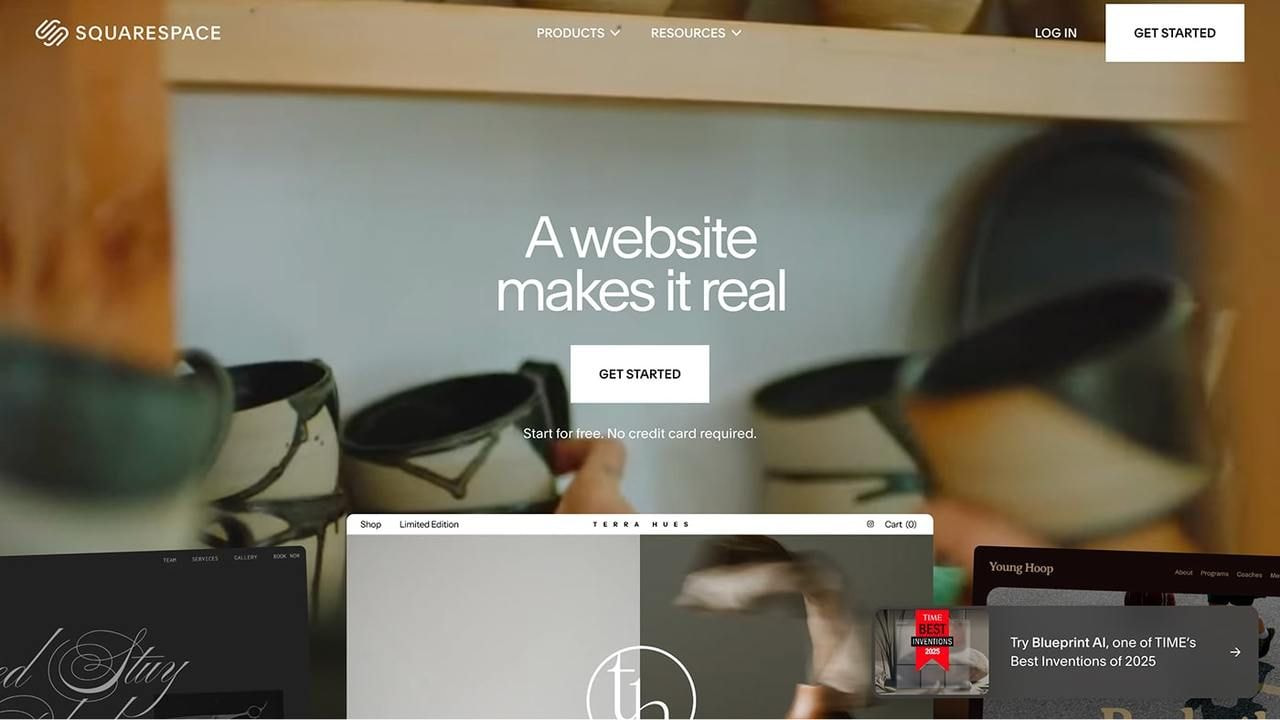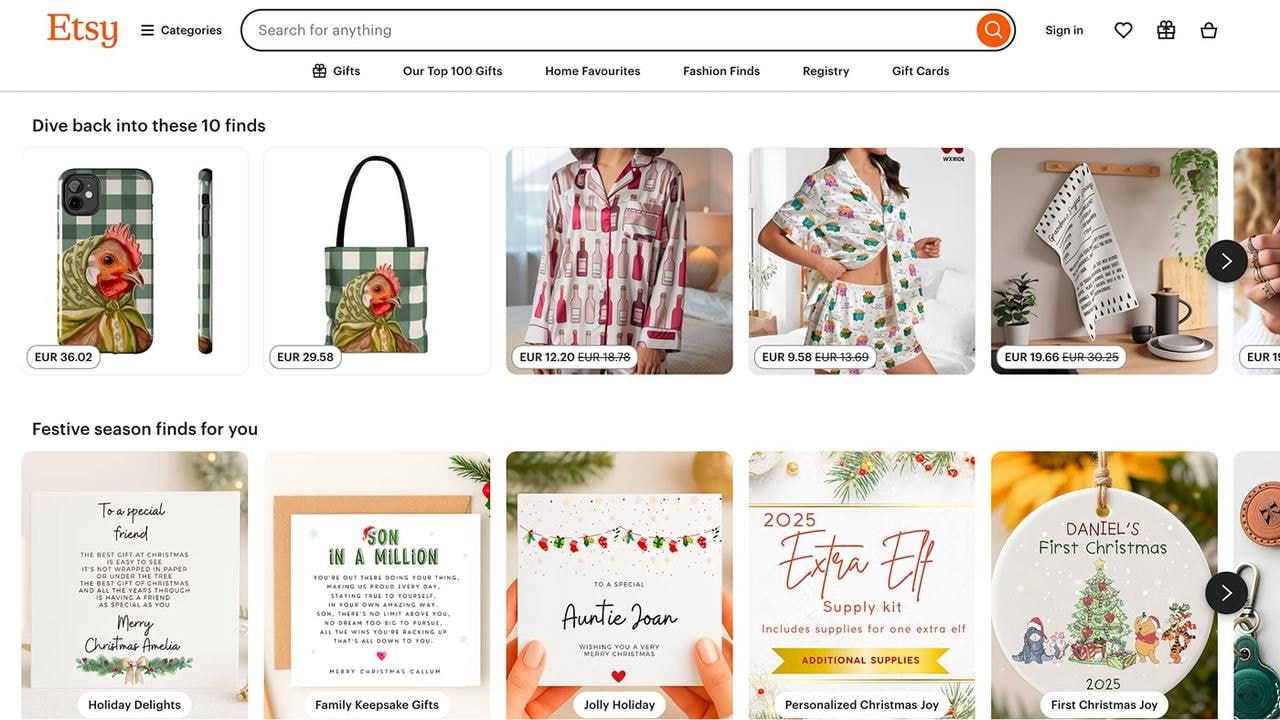Table of contents
To start a personalized gift store, you’ll need a mix of tools for designing products, fulfilling orders, building your website, and promoting your brand. Think platforms like Printful for fulfillment, Canva for design, Shopify for your storefront, and Buffer for social media.
But with so many apps out there, finding the right stack can seem overwhelming.
That’s why we created this guide to help you find the top tools to start a personalized gift store and build a business that’s bound to be a big hit.
Why are personalized gifts booming?
Personalized gifts are booming because people crave deeper connections and more meaningful experiences instead of generic items. Today’s shoppers want thoughtful gifts that say, “This was made just for you.”
Here’s what’s driving the growth of the personalized products business:
-
Emotional connection. Think of a custom mug with a friend’s favorite quote, or a photo book filled with family memories. These gifts remind people of who they are, who they love, and why it matters.
-
Individuality. People want gifts with a personal touch that reflect the recipient’s style or story. A personalized candle with their name or catch phrase feels more special than a mass-produced one, leading to higher customer satisfaction.
-
Social media trends. Visually appealing items – such as custom photo gifts or engraved jewelry – perform well on Instagram and TikTok. When people post them, others get inspired to spend money on something similar.
-
Easy personalization. Today’s web-to-print solutions and product designer tools have made selling personalized items easier than ever – even if you’re not tech-savvy.
-
Repeat customers. Personalized products make it easy to reorder the same item for different special occasions, each with its own custom design. This built-in flexibility leads to repeat business.
And the numbers back these up. The customized gift industry is expected to grow to $10.76 billion by 2029, with annual sales increasing at 6.7%.
Now’s the perfect time to take part in this niche. Let’s explore the top tools to start a personalized gift store and turn your creative ideas into a thriving business.
Best tools to produce and ship personalized gifts
Want to start selling personalized items without the hassle? These tools help you create custom products, manage orders, and deliver every gift without lifting a single box.
Printful

Don’t have the budget or space to start an online business? Printful’s print-on-demand service produces, packs, and ships personalized products on your behalf, so you can launch your online store without inventory or upfront costs.
Why it’s great:
-
Over 479 customizable products to choose from, like custom photo mugs, wall art, apparel, accessories, and more.
-
Over 193 embroidery-ready products – a super popular personalized gifts category.
-
A beginner-friendly Design Maker that lets you upload your own images or use clipart, fonts, and Getty Images assets to create stunning, personalizable products.
-
Easy-to-use personalization tool – just activate it in a few clicks to allow customers to add their personalized touches to their order.
-
Bulk order discounts – great for corporate personalized gifts or client bundles.
-
Printful has fulfillment centers worldwide, so your business isn’t limited to a single market.
Ideal for: Selling high-quality custom products – especially personalized embroidered gifts – without dealing with upfront investment or storage.
Read more
How to dropship personalized products: The ultimate guide
Printify

Looking for more control over who produces your products? Printify is a print-on-demand platform similar to Printful, but instead of relying on a single POD company for all printing, you can select your preferred Print Provider based on location, price, or reviews.
Why it’s great:
-
Huge product catalog with over 1,400 items – from custom clothing and personalized home decor to seasonal gifts like Christmas greeting cards.
-
Their Product Creator is an easy-to-use personalization tool that lets customers design meaningful gifts with monograms, names, or special messages.
-
Built-in AI image generator to help you create custom graphics.
-
A Trends tool that highlights what’s hot right now and uses AI to turn those ideas into ready-to-use designs.
-
Their Print Provider network operates worldwide, so you can sell on a global scale.
Ideal for: Sellers who want complete control in choosing their printing service. Just note that the embroidery product range is smaller than Printful’s.


Top design tools for creating personalized products

Although print-on-demand platforms like Printful offer built-in design tools, you may want a dedicated app for tasks such as image editing, illustration, or layout adjustments. This way, you can design a truly unique gift that speaks to your ideal customer.
Canva
Canva is a browser-based design tool made for non-designers. Its drag-and-drop editor and huge library of creative assets make designing personalized products quick and easy.
Why it’s great:
-
Built-in AI image generator for creating high-quality images.
-
Magic Resize tool to repurpose one design across multiple personalized products.
-
Access to pop culture-inspired designs, many of which can be used commercially.
Ideal for: Anyone with zero design experience.
Adobe Creative Cloud
Adobe’s suite of design tools is trusted by up-and-coming creators and successful business owners alike. Whether you need quick templates or full creative control, Adobe has something for every skill level.
Why it’s great:
-
Adobe Express is a free, browser-based tool with tons of creative assets and AI tools.
-
Adobe Illustrator is perfect for creating graphics like logos or typography-based designs.
-
Photoshop gives you full control over image editing and retouching, excellent for creating custom photo gifts.
Ideal for: Those who want pro-level design software to elevate their personalized gifts.
Best eCommerce platforms to sell personalized gifts
Choosing the right eCommerce platform to sell your print-on-demand products is important for building a successful business. To maintain a strong online presence, you need a storefront that’s easy to customize and manage.
Let’s look at the top platforms to start a personalized gift shop and their key features.
Quick tip
Visit our integrations page to see the full list of eCommerce platforms that you can connect with Printful.
Shopify

Source: Shopify
Shopify is one of the most popular online store builders for selling personalized items. It's easy to use, highly customizable, and ideal for long-term growth.
Why it’s great:
-
Flexible pricing that gives you more control over your profit margins. Users can start for free, then pay $1/month for three months. After that, plans start at $29/month.
-
Use the Zepto Product Personalizer app to offer personalization directly on product pages – no need to collect details at checkout.
-
Access to over 800 online store themes to match your brand.
Ideal for: Those looking for a reputable, all-in-one solution, with everything needed to sell online.
Squarespace

Source: Squarespace
If you’re selling premium personalized gifts or customized home decor, Squarespace helps you create a store that looks just as polished as your products.
Why it’s great:
-
Designer-made templates with clean, minimal layouts.
-
Zero transaction fees on higher-tier plans.
-
Marketing tools like announcement banners and built-in SEO features help your store appear in search engines.
Ideal for: Creators who want a clean, professional storefront.
Etsy

Source: Etsy
Etsy is one of the best eCommerce marketplaces to start a personalized gift business online. Known for custom goods, it’s full of shoppers looking for unique presents for their loved ones.
Why it’s great:
-
Large built-in audience with active niche groups looking for customized gifts, from newlyweds to pet owners.
-
No need to build or maintain your own online store.
-
Promotional tools to boost your listings within Etsy or across the internet.
Ideal for: Tapping into a community that’s already searching for the perfect gift.
TikTok Shop

Source: TikTok Shop
TikTok Shop combines content and commerce, letting you sell personalized gifts directly through videos, live streams, and your profile.
Why it’s great:
-
A chance to go viral and reach new audiences without relying on paid ads.
-
Huge user base across all kinds of niches – from beauty lovers to travelers shopping for customized travel accessories.
-
You promote and sell in one place by creating gift guides, tutorials, and unboxing videos.
Ideal for: Sellers who know how to charm the camera and turn views into sales.
Read more
How to sell on TikTok Shop


Marketing tools to grow your personalized gift brand

The gift industry is more competitive than ever. To make your products stand out, you’ll need the right tools to promote your personalized gift business.
Buffer
Buffer makes it easy to plan and schedule social media posts so you stay consistent without being glued to your phone.
Why it’s great:
-
Drag-and-drop calendar for managing posts across major social platforms.
-
AI-powered tools for generating social media copy.
-
Analytics to track engagement and best posting times on TikTok, Instagram, Facebook, and more.
Ideal for: Automating your social media tasks.
Klaviyo
Want to boost customer loyalty and keep people coming back? One of the most effective ways to do that is through email and SMS marketing. Klaviyo helps you stay top of mind with messages your customers actually want to open.
Why it’s great:
-
Templates to create automated messages like welcome emails and abandoned cart reminders.
-
Tools to segment your customers and send more relevant personalized product recommendations.
-
An AI subject line generator to help boost engagement.
Ideal for: Driving repeat business and staying connected with customers.
CapCut
If you plan to create video content for TikTok, Instagram Reels, or YouTube Shorts, you’ll need a smart video editor like CapCut.
Why it’s great:
-
Ready-made templates, music, and effects.
-
Easy tools to add text, transitions, and animations that show off your amazing personalized gifts.
-
Optimized for vertical video, so everything fits the format of today’s top platforms.
Ideal for: Making scroll-stopping videos without hiring a professional.
Analytics tools to optimize your personalized gift business

Whether you’re selling goofy photo mugs or sleek, sustainable personalized gifts, understanding what’s working in your business is key to growing it. These analytics tools help you track customer behavior and make smarter decisions.
Google Analytics
Google Analytics shows who’s visiting your site, what they’re clicking on, and how they found you. It’s one of the most powerful free tools to measure your online store’s performance.
Why it’s great:
-
Tracks where your traffic comes from and what pages perform best.
-
Helps you understand what drives sales and where customers drop off.
-
Pairs well with other business tools like Google Ads and Search Console.
Ideal for: Making data-driven decisions to improve your store.
Similarweb
Similarweb lets you see where competitor traffic comes from, what keywords they rank for, and how people find their stores, helping you spot new selling opportunities.
Why it’s great:
-
Analyze competitor websites to see what’s driving their traffic.
-
Discover which traffic channels work best in your niche.
-
Explore real-time data on personalized gift market trends to guide your next product.
Ideal for: Doing market research before launching a new personalized gift product or staying ahead of competitors.
Top tools to improve your customer experience and reviews

These platforms help you deliver a better shopping service and turn happy customers into repeat buyers.
Tidio
Tidio lets you chat with customers in real time or use AI chatbots to answer common questions, even when you’re offline.
Why it’s great:
-
Brings all your customer messages from live chat, email, and Messenger into one place.
-
Chatbots can answer common questions like shipping times or personalization options.
-
Built-in analytics that show how your chats are performing.
Ideal for: Offering customer support without hiring a team.
Loox
Loox is a Shopify app that helps you collect and display reviews from happy customers, turning social proof into sales.
Why it’s great:
-
Automatically sends review requests after each order.
-
Customers can upload photos of their personalized gifts as testimonials.
-
Referral feature to reward customers for sharing your store with friends and family.
Ideal for: Building trust and helping potential buyers see your personalized products in real life.
How to launch your personalized gift store using these tools

Let’s see how to bring all these tools together and start a personalized gift business.
1. Decide what to sell
Create a personalized gift business plan and choose which niche to focus on – pet lovers, newlyweds, corporate personalized gifts? Focusing on a specific target audience makes it easier for your brand to stand out.
Use tools like Similarweb for market research or explore what’s currently best-selling on Etsy.
2. Sign up for Printful and connect your store
Create your free Printful account and connect it to your online store on Shopify, Squarespace, Etsy, TikTok Shop, or others. Check out the Integrations category in our Help Center for detailed setup guides.
3. Create your personalized products
Choose a customizable item from our Product Catalog. Then, add your design in one of two ways:
-
Use our Design Maker to upload your own photos or artwork, or choose from thousands of built-in clipart, fonts, and templates.
-
Upload a finished design you created in tools like Canva, Adobe Photoshop, or Adobe Illustrator.
To offer personalization with Printful, read the guides below:
-
How can I set up a personalized product on my Shopify store?
-
How do I offer personalization for integrations without official support?
4. Start selling
Go ahead and publish the products to your shop. From there, simply track what’s working on your store with Google Analytics, use promotional tools like Klaviyo and Buffer, and improve your customer experience with Tidio or Loox.
Quick tip
Need a full walkthrough? Check out our step-by-step guide on how to start a print-on-demand business.


Conclusion
We’ve covered the top tools to start a personalized gift store – here’s a solid lineup you may want to start with:
-
Printful for fulfillment and easy product personalization.
-
Canva to design eye-catching custom gifts.
-
Photoshop to create and edit personalized photo gifts.
-
Etsy to reach a built-in audience already shopping for thoughtful gifts.
-
Buffer to schedule and automate your social media posts.
-
Google Analytics to track what’s working in your business.
With the right tools and a clear plan, anyone can establish a successful personalized gift business.
FAQ
Top-selling gift shop items include:
-
Personalized products like custom mugs, t-shirts, and embroidered tote bags.
-
Seasonal gifts for holidays like Christmas, Valentine’s Day, and Mother’s Day.
-
Local crafts such as handmade candles or region-specific artwork.
Some of the best-selling personalized items include:
-
Apparel like t-shirts, hoodies, and baby bodysuits.
-
Home goods such as mugs, pillows, wall art, and blankets.
-
Accessories like embroidered beanies, custom tote bags, and phone cases.
-
Personalized photo gifts, including framed prints and posters.
If you're using a platform like Printful, you don’t need any machines. We’ll handle all the printing, embroidery, and shipping for you. Check out our Product and Service Quality page to see the top-leading equipment we use to create your custom items.
To open a gift shop, here’s what you’ll need:
-
A Printful account – free to sign up, no subscription required.
-
An online store on platforms like Shopify, Etsy, or TikTok Shop.
-
Design tools like Canva or Adobe Express to create custom artwork.
-
Marketing tools to help you reach your target audience and grow your brand.

Maisha is a content writer with 6+ years of experience in turning complex topics into clear, search-optimized content. She believes readability always wins, no matter how SEO trends shift. Outside of writing, she’s usually trying new recipes (but never following them), watching niche YouTube videos, or planning food-fueled adventures.





